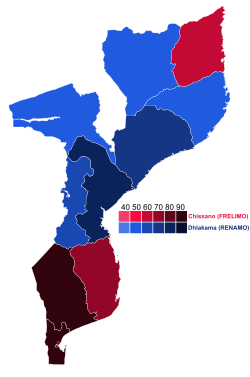| |||||||||||||||||||
Presidential election | |||||||||||||||||||
| Turnout | 69.51% ( | ||||||||||||||||||
|---|---|---|---|---|---|---|---|---|---|---|---|---|---|---|---|---|---|---|---|
| |||||||||||||||||||
This lists parties that won seats. See the complete results below. | |||||||||||||||||||
Maps | |||||||||||||||||||
| |||||||||||||||||||
 |
|---|
General elections were held in Mozambique between 3 and 5 December 1999 to elect a president and the Assembly of the Republic. Incumbent president Joaquim Chissano won a narrow victory against Afonso Dhlakama, whilst Chissano's FRELIMO party won the Assembly elections, taking 133 of the 250 seats. Voter turnout for the elections was around 68–70%. [1]




